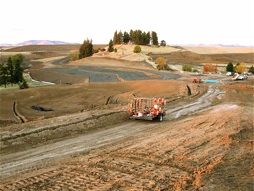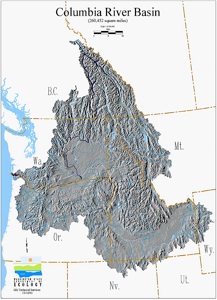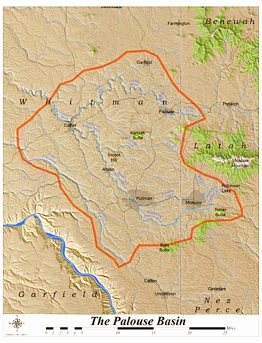Scotty Cornelius (shown here), Palouse Water Conservation Network, and Palouse Group Sierra Club have appealed a Washington Department of Ecology water right decision for Washington State University (WSU). The state-issued water right allows WSU to increase its pumping from the Grande Ronde Aquifer. Photo source: John Osborn

Overview
Washington State University is located in Pullman, Washington which, along with the companion town of Moscow, Idaho and the University of Idaho (7 miles east) are home to about 50,000 people. The region depends on deep groundwater as the sole source of municipal water supply. Pullman, Moscow, WSU, and the University of Idaho (UI) pump large amounts of water from the deep Grande Ronde Aquifer.
The Grande Ronde Aquifer is part of the regional Columbia Basin basalt aquifer system, but appears to be locally isolated. For several decades the water levels in the Grande Ronde Aquifer have been in decline – up to 3 feet per year – due to pumping by the cities and universities. This is a dramatic and disturbing problem as the unsustainable use of water threatens the viability of these communities. A local committee was formed to study the issue, but is dominated by the water users and has failed to achieve the common goal of reversing the groundwater declines. It is a classic “race to the bottom” scenario in which major water users are incapable of policing themselves to promote the public interest and common good.
The State of Washington has, over the years, granted a generous number of water rights to Washington State University (WSU). Fortunately, WSU has not pumped its total allocation – in fact it pumps only about one-third of its paper rights. Recently WSU applied to consolidate all of its rights so that it may pump from new wells. The prime motivation is WSU’s (controversial) decision to build a new golf course – which will lead to significantly more water use. Many people in the community believe it is inappropriate to irrigate a new golf course when the problem of unsustainable use of groundwater has not been solved.
The Washington Dep’t of Ecology (Ecology) approved WSU’s request to consolidate its water rights. Ecology failed to acknowledge that groundwater is being mined and interpreted the water code in a manner that undermines the usual statutory tests for public interest, impairment, impacts to surface waters, and “use it or lose it” requirements. The given reason is that WSU is a “municipality” as defined under Washington’s new municipal water law (HB 1338) and therefore entitled as a matter of law to pump all of the water allocated in its water rights, regardless of consequences.
2 Legal challenges
WSU is building its golf course. At present virtually nothing is being done to address the groundwater mining problem that threatens the water future of these dependent communities.
The State’s WSU water right decisions present several legal issues. The primary issue is local: protection of groundwater levels, and the public interest, in a sole source drinking water aquifer, along with protection of regional streams that are fed by the aquifer system.
Another problem is WSU’s implementation of HB 1338. [Click here for more on 1338]. Tribes and conservation groups are challenging the constitutionality of 1338. A favorable decision will lead to new approaches to water management at the local level.
The WSU water right decisions provide a picture-perfect example of the folly of HB 1338: a depleted aquifer and “paper” water rights made real by an unconstitutional law that now threatens the water future of a community.
A successful challenge to HB 1338 will not only halt future over-appropriation of water from the state’s rivers such as the Spokane River, but require the state and institutional water users to address the fact of existing over-appropriation and potential solutions to this problem in view of future growth and economic development.
Next: An Aquifer in Trouble

Stripping away vegetation from the historic Carriage Road to build WSU’s new 18 hole golf course.
Photo source: Scotty Cornelius


*
Several aquifers in the Columbia Basin are being mined of water, but none more so than the Grande Ronde Aquifer in the Palouse Basin.
This aquifer serves as the sole source drinking water for the cities of Pullman, Washington, and Moscow, Idaho, and Washington State University and the University of Idaho. Click map to enlarge.
Map source: “Ecology Investment Atlas, Columbia Basin Projects, July 1, 2005 - June 30, 2007, $18,626,693” WA Dept of Ecology.
The red line delineates the working boundary for the Palouse Grande Ronde Ground Water Basin. Grande Ronde groundwater is the sole drinking water supply for the communities of Pullman and Moscow. Click map to enlarge.
Source: 2002-2005 Palouse Ground Water Basin Water Use Report, Steve Robischon, prepared for the Palouse Basin Aquifer Committee, October 2006


Palouse Ridge Golf Course. The Department of Ecology approved water rights that will allow WSU to irrigate this golf course using dwindling supplies of ground water. The Grande Ronde Aquifer is being mined, and water levels are dropping between one and three feet each year. Photo source: Washington State University
Washington State University: “World Class, Face to Face”. Despite the institutional commitment to sustainability, WSU is building a new 18-hole golf course that will further deplete the region’s dwindling groundwater resources.
Crisis in Sustainability: Mining Aquifers
Washington, WSU & the Grande Ronde Aquifer
Troubling questions about water and the public trust when
the State of Washington and Washington State University
use dwindling ground water supplies to irrigate a new golf course.









